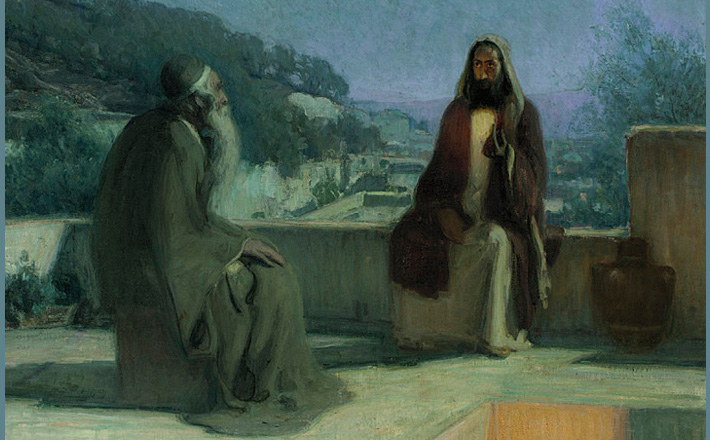Commentary on Genesis 12:1-4a
God unsettles Abram and Sarai, both literally and figuratively.
God’s call to Abram to go invites reflection on two particular themes that speak to this literal and figurative unsettling: migration and vocation, respectively.
Migration
God calls Abram and Sarai to leave a settled place and become migrants. The repetitions of the prepositional phrases in verse 1 — “from your land, from your kindred, and from the house of your father” — underscore the coming alienation of Abram from his ancestral places and people, everything that has rooted him. Although their final destination is Canaan, Abram and Sarai’s journey from Haran is a long one, and their safe passage depends upon the hospitality of the people they meet along the way. They are sidetracked by famine soon into their trip, forcing them to sojourn in Egypt. Abraham and his family are repeatedly described with the Hebrew root gwr, referring to resident aliens sojourning among other peoples (12:10, 17:8, 20:1, 21:23, 21:34). Even when Abraham has settled in Canaan, he must negotiate for a burial plot when Sarah dies, describing himself to the Canaanites as “a stranger and an alien residing among you” (Hebrew ger and toshab, Genesis 23:4).
It is important to note that Abram and Sarai — whose names will soon be changed to Abraham and Sarah — are wealthy migrants, “very rich in livestock, in silver, and in gold” (Genesis 13:2). Even so, their wealth does not make them invulnerable. Twice Abram fears that, as he and Sarai “reside as an alien” (12:10, 20:10) in Egypt and then Gerar, that he will be killed and that Sarah will be stolen into the king’s court as a wife (Genesis 12:10-20 and 20:1-18).
To avoid his death, Abram asks Sarai, “Say you are my sister, so that it may go well with me because of you, and that my life may be spared on your account” (Genesis 12:13). Sarai must have agreed, because she is indeed taken into Pharaoh’s household, and Abram receives much wealth in return.1 We may be quick to judge Abram for selling his wife to save his own skin, but these kinds of awful choices mirror the very real negotiations migrants and refugees face to survive, even today. The text spurs those of us who are “settled” to evaluate our own practices of hospitality to all who are vulnerable.
Vocation
The word “vocation” conjures up several different meanings. For some it is synonymous with a job, even specifically paid work, with one’s “avocation” referring to a hobby or other unpaid pursuits. For others, it recalls Frederick Buechner’s famous description of vocation as “the place where your deep gladness and the world’s deep hunger meet.”2 The call of Abraham reminds us of the broadest definition of vocation, one that transcends that category of work altogether and that gets most directly at the root of the word: following the call of God upon one’s life. When God says, “Go,” what does that mean for Abram? What does it mean for us?
Although these four and a half verses are but a brief introduction to a long and riveting story, their literary structure shows the profound shift this call requires of Abram. We have already seen that the repetition of the prepositional phrases in verse 1 requires Abram to leave behind the rootedness of his ancestral identity. That identity — “your land, your kindred, the house of your father” — is supplanted by a long list of things that God will do to and for Abram:
I will show you (the land)
I will make you (a great nation)
I will bless you
I will make great your name
I will bless those who bless you
I will curse the one who curses you
God calls Abram to shift his identity from rootedness in his land, family, and household, to being one who is acted upon by God. Abram’s chosen-ness requires a certain amount of loss. And yet, by following God’s call, Abram ushers in God’s blessings for his family and for all the families of the earth.
The metaphor of a “journey” can be a helpful one for describing life as one who is called by God. In my experience, many laypeople associate the idea of a “vocation” or “call” with pastoral roles, or perhaps service-oriented vocations in general, rather than with the totality of any Christian’s life. Introducing that language in association with this text, along with the metaphor, could be particularly fruitful.
Living as one who is called can be “unsettling,” as it was for Abram and Sarai. For them it required a physical change, but also a spiritual reorientation. As the subsequent details of Abraham’s story in Genesis 12-25 continue to show, God’s promises do not spare Abraham and his family from danger, desperation, jealousy, heartbreak, or grief. In fact, the call itself even brings about loss of things and people held dear in the past. Yet this brief lection reminds us that Sarah and Abraham’s journey is not about what they are doing, but what God is doing.
Notes:
1 In the Genesis 20 version of this story the text goes out of its way to emphasize that the relationship between Sarah and King Abimelech of Gerar is never consummated. No such assurances are provided in Genesis 12; Sarah is taken into Pharaoh’s house (12:15) as Pharaoh’s wife (12:19).
2 Frederick Buechner, Wishful Thinking: A Seeker’s ABC (New York: HarperOne, 1993), 119.


March 12, 2017